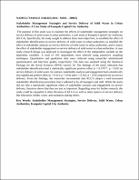| dc.description.abstract | NAMULI TAMALE SARAH (2014 - M102 – 20063)
Stakeholder Management Strategies and Service Delivery of Solid Waste in Urban Authorities: A Case Study of Kampala Capital City Authority.
The purpose of this study was to examine the effects of stakeholder management strategies on service delivery of solid waste in urban authorities, a case study of Kampala Capital City Authority (KCCA). Specifically, the study sought to address three main objectives, to establish the effect of stakeholder identification on service delivery of solid waste in urban authorities, to establish the effect of stakeholder analysis on service delivery of solid waste in urban authorities, and to assess the effect of stakeholder engagement on service delivery of solid waste in urban authorities. A case study research design was deployed to investigate the effect of the independent variable on the dependent variables. A total of 103 respondents were selected using purposive sampling techniques. Quantitative and qualitative data were collected using researcher administered questionnaires and interview guides, respectively. The data was analysed using the Statistical Package for the Social Sciences (SPSS) version 20. The findings of the study indicated that stakeholder identification had a statistically significant positive effect (r = 0.374**, p < 0.01) on service delivery of solid waste. In contrast, stakeholder analysis and engagement had a statistically non-significant positive effect (r = 0.221, p < 0.01) and (r = 0.162, p < 0.01) respectively on service delivery. From the findings, the researcher recommends that KCCA adopts a well-structured stakeholder identification procedure that is adhered to by all managers and staff. While the study did not find a statistically significant effect of stakeholder analysis and engagement on service delivery, literature shows that they are just as important. Regarding areas for further research, the study could be expanded to other divisions of KCCA as well as other aspects of service delivery like education, health, water, and sanitation among others.
Key Words: Stakeholder Management Strategies, Service Delivery, Solid Waste, Urban Authorities, Kampala Capital City Authority. | en_US |


